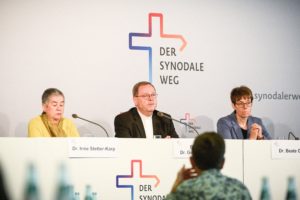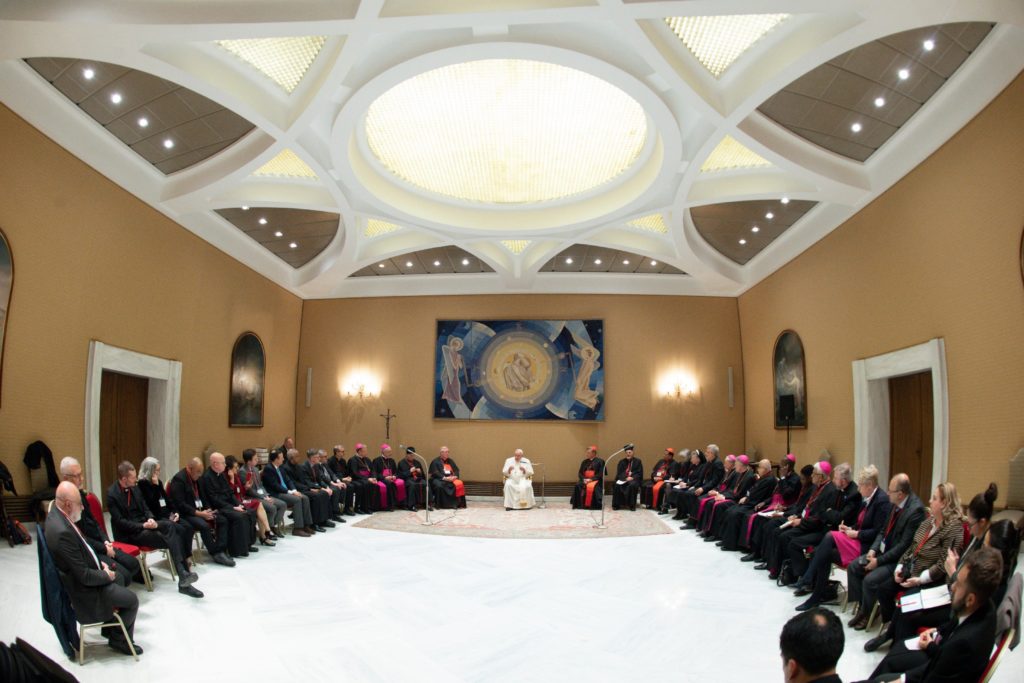ROME — On Tuesday, July 9, the Vatican issued the working document, technically known as the Instrumentum Laboris, for the closing act in October of Pope Francis’ long-running Synod of Bishops on Synodality, a process intended to cement his legacy for the Catholic Church.
In most media coverage, the 30-page text has been described as something of a letdown, given that it appears to take several of the most intensely debated matters, such as women deacons, Catholics who identify as LGBT, and married priests off the table, assigning them instead to study groups within the Vatican’s Dicastery for the Doctrine of the Faith.
As anyone acquainted with bureaucratic logic knows, handing a tough choice off to a study group usually is a prescription for punting it down the line.
In all honesty, however, this development should hardly be a surprise.
Not only has Francis repeatedly insisted that he wants the assembly to focus broadly on the ways and means of a more dialogic Church, rather than getting bogged down by a narrow canon of controversial issues, he’s also basically preempted the discussion on those matters by acting unilaterally.
When it comes to LBGT-related issues, he approved the document Fiducia Supplicans (Supplicating Trust) last December, authorizing priests to bless people involved in same-sex relationships, while at the same time permitting wide diversity in how that permission is applied — allowing the bishops of Africa, for instance, basically to take a pass.
With regard to women deacons, he used an interview with CBS in May to offer a seemingly clear no. Some have detected slight wiggle room in the fact that the Instrumentum Laboris (Working Instrument) says the question will be assigned to a study group, but given that Francis has already heard the conclusions of two different commissions as well as the first synodal assembly last October, it appears reasonable to think that if there was going to be movement in this papacy, it would already have happened.
As far as celibacy goes, the pope received a clear request for greater latitude from his own Synod of Bishops on the Amazon in 2019 and didn’t pull the trigger then, so there’s no a priori reason to believe he’s more inclined to do so now.
So, does all this mean the Oct. 2-27 gathering in Rome is destined to be a dud?
Perhaps not, because even with the focus shifting away from matters which had heretofore dominated conversation, there are still three great conundrums which shine through the working document, and which participants will have the opportunity to address should they choose to seize it.
To begin with, the document calls for reflection on the exercise of authority in the Church, including the interplay among synodality, collegiality, and primacy — respectively, the sensus fidelium, the bishops, and the pope. In general, the idea is to promote a “sound decentralization,” transferring responsibility for at least some decisions from Rome to the local churches. The last such section deals specifically with downsizing the papacy itself.
Yet the practical reality is that in Catholicism, the greatest and most meaningful changes in the Church often occur as a result of papal fiat. We didn’t get the Second Vatican Council in the 1960s, for example, as the result of wide process of consultation — it occurred because the pope at the time, John XXIII, felt an inspiration and acted upon it, basically unilaterally and in the teeth of oft-stiff opposition from some of his own advisers.
In fact, this entire synodal process is much the same story. At the beginning, the decision to launch the process wasn’t really bottom-up but top-down, a reflection of Pope Francis’ own personal vision, even if it evolved into a massive consultation exercise along the way.
The first challenge, therefore, is how to reconceive central authority in the Church without sacrificing its unique capacity to move the institution when nothing else can.
The second conundrum pivots on how to promote accountability in a church where, to some extent, it’s almost a foreign concept. The term appears 19 times in the English translation of the Instrumentum Laboris, but how to put those calls into practice remains a head-scratcher.
The challenges are both sociological and ecclesiological.
Sociologically, the Vatican remains an overwhelmingly Italian institution, and it’s telling that there is no precise Italian translation for the word “accountability.” In the Italian version of the document, in fact, the term used is rendiconto, which literally just means “report,” accompanied by a parenthesis that adds “accountability [is] an English term also used in other languages.”
Just about the only arena of Italian life where there’s a culture of accountability that approximates the Anglo-Saxon model is soccer, where the coach of a losing team often gets fired. Soccer, however, is probably the most international institution in the country, accustomed to foreign ownership, management and players — not something, really, that could easily be said of the Vatican at its middle and lower levels.
How to graft such a foreign concept onto an institution where it’s never really been part of the scene remains unclear.
In terms of ecclesiology, to the extent the Church has had a concept of accountability, it’s almost the opposite of what people mean by it today. Over the centuries, leadership has been regarded primarily as accountable to the apostolic tradition, and ultimately to God as its author. In other words, accountability runs up to the divine, not down to the consent of the governed.
How to blend the traditional and contemporary understandings of accountability into a creative synthesis, therefore, could be another great undertaking.

Third, the synod also faces the conundrum of how to promote a process of reform without it shading off into revolution.
That this is not an idle prospect is demonstrated by the Vatican’s ongoing tug of war with the German church and its “Synodal Way,” which has largely come down to a question of authority. The Germans want to create a new governing body for the Church in the country in which laity would have a decisive role, while the Vatican insists that hierarchical authority in itself isn’t up for grabs, but rather the mode in which it’s exercised.
In some ways, the situation is similar to the Congress of Ems in 1786, when four German-speaking Prince Archbishops of the Holy Roman Empire (from Mainz, Cologne, Trier, and Salzburg) declared a sort of de facto rejection of papal primacy. Among other things, they wanted all papal nunciatures abolished, seeing the presence of an envoy from Rome as an unwarranted assertion of papal supervision.
Pope Pius VI was compelled to spend the next decade fighting off the German uprising, until the French Revolution and Napoleon’s hostility to the Church finally persuaded the archbishops that maybe having a powerful international patron with his own diplomatic corps wasn’t such a bad thing after all. (Of course, Pius VI eventually would be taken prisoner by Napoleon and died in exile in Valence, but all that only served to reinforce popular support for papal sovereignty.)
The challenge, then as now, is to find a balance between change and continuity, between listening to the People of God and listening to the wisdom of tradition, all the while making sure things don’t spin out of control in the meantime.
Should the synod take up these questions, it could still prove a fascinating discussion indeed … even without headline-grabbing topics that drive traffic, if not always transformation.

